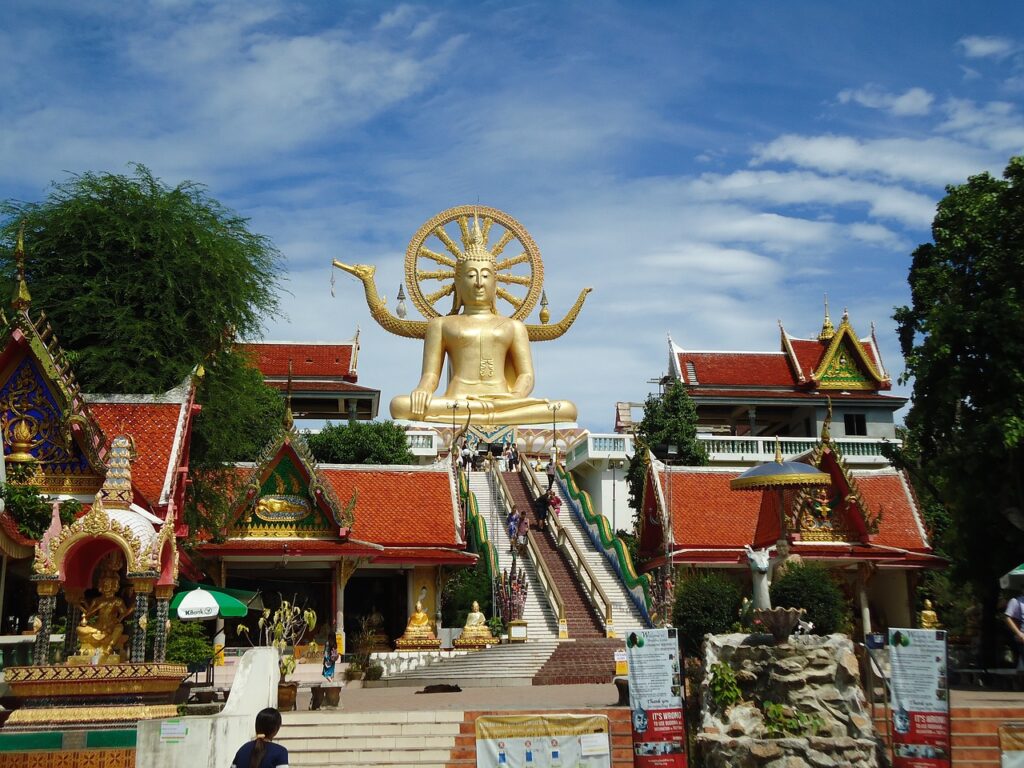Koh Samui, with its stunning beaches, tropical climate, and laid-back atmosphere, offers a lifestyle that many people dream of. Whether you’re seeking an escape from the fast pace of city life or a tranquil place to retire, living in Koh Samui provides a unique opportunity to immerse yourself in a peaceful, island environment. The island’s charm lies in its natural beauty and slower pace of life, which attracts expats and retirees from around the world.

However, as idyllic as it sounds, life in Koh Samui has its share of challenges. From adapting to the tropical weather to navigating local services, it’s important to consider both the positives and potential drawbacks. In this guide, we’ll explore the pros and cons of living in Koh Samui, offering you a balanced perspective so you can make an informed decision about whether this tropical paradise is the right fit for your next chapter.
Pros of Living in Koh Samui
Living in Koh Samui comes with numerous benefits that appeal to expats, retirees, and anyone seeking a tropical escape. From the island’s breathtaking scenery to its relaxed way of life, Koh Samui offers a lifestyle that combines beauty and simplicity.
1. Beautiful Scenery and Beaches
One of the most appealing aspects of living in Koh Samui is the island’s unparalleled natural beauty. Imagine waking up each morning to views of crystal-clear waters, white sandy beaches, and lush, green hills. Whether you’re relaxing by the ocean, trekking through jungle trails, or exploring hidden waterfalls, Koh Samui provides an idyllic backdrop for outdoor lovers.
For those lucky enough to live here, breathtaking scenery isn’t just reserved for weekend getaways. Many villas and homes on the island offer panoramic views of the sea or the island’s tropical landscape, allowing you to soak in nature’s beauty right from your doorstep. Living in such close proximity to nature fosters a peaceful and inspiring environment for daily life.
2. Relaxed Lifestyle
Another major benefit of living in Koh Samui is its relaxed, stress-free lifestyle. Unlike the fast-paced rhythm of city life, Koh Samui invites you to slow down, focus on well-being, and enjoy the simple pleasures. Residents can easily find balance through activities like yoga on the beach, attending local markets, or enjoying freshly prepared Thai meals.
The island’s slower pace encourages mindfulness and wellness, making it an attractive destination for those seeking to unwind and recharge. The tight-knit expat community also adds to this sense of belonging. Newcomers often find it easy to meet people through social clubs, fitness groups, or even casual encounters at local coffee shops. Whether you’re looking to forge new friendships or embrace a peaceful, solo lifestyle, Koh Samui offers plenty of opportunities to feel connected while living at your own pace.

3. Affordable Cost of Living
One of the key advantages of life in Koh Samui is the affordable cost of living, especially when compared to many Western countries. Everyday expenses like groceries, eating out, and transportation tend to be significantly cheaper, allowing you to maintain a comfortable lifestyle on a reasonable budget. Whether you’re renting a cozy home or purchasing a villa, housing prices on the island are also far lower than in major global cities.
Koh Samui offers a wide range of affordable local markets, where fresh fruits, vegetables, and seafood are plentiful and inexpensive. For food enthusiasts, the island’s affordable and delicious Thai cuisine is a highlight—often, dining at a local restaurant or food stall can be cheaper than cooking at home. This blend of affordability and quality adds to the overall appeal of island life.
4. Warm Climate Year-Round
If you thrive in sunshine, Koh Samui’s tropical climate will feel like paradise. The island enjoys warm weather year-round, making it ideal for outdoor activities like swimming, hiking, and beach relaxation. With temperatures rarely dipping below 25°C (77°F), the climate is perfect for those who enjoy basking in the sun and participating in water sports or leisurely seaside strolls.
Additionally, the lack of a harsh winter season means there’s no need to worry about cold weather, bulky winter clothing, or the rising costs of heating. For people who enjoy consistent warmth and a sun-soaked lifestyle, Koh Samui provides a year-round playground of outdoor possibilities.

Cons of Living in Koh Samui
While living in Koh Samui offers many appealing benefits, there are several challenges to consider that may impact day-to-day life. From weather conditions to limited infrastructure, these factors may require some adjustment for those planning to make the island their home.
1. High Humidity and Rainy Season
Though Koh Samui enjoys warm weather year-round, the island’s tropical climate comes with its downsides, such as high humidity and an intense rainy season. From October to December, the island experiences frequent heavy rainfall, thunderstorms, and occasional flooding in low-lying areas. These weather conditions can disrupt daily activities, making travel difficult and outdoor plans uncertain.
The humidity can also be overwhelming, especially for those who are not used to such climates. It can make everyday tasks more exhausting, and mold or mildew growth may become an issue in homes. To combat this, it’s important to ensure that your villa is equipped with air conditioning, and maintaining proper hydration is essential, particularly during the hottest months.
2. Limited Healthcare Facilities
One of the most important considerations for expats and retirees is the availability of healthcare services. While Koh Samui has private clinics and a few hospitals, the healthcare infrastructure on the island is limited compared to larger Thai cities like Bangkok or Chiang Mai. For major medical treatments, emergencies, or specialist care, residents often need to travel to the mainland or Bangkok, which can be time-consuming and costly.
For those with ongoing medical conditions or health concerns, the limited options on Koh Samui may be a challenge. Many expats and retirees opt for international health insurance to cover the higher costs of treatments and to ensure access to quality care both on and off the island.
3. Public Transportation Challenges
Koh Samui’s public transportation system is not as developed as in other parts of Thailand. While the island does have songthaews (shared taxis) and motorbike taxis, they do not run on a fixed schedule, and routes can be limited. There is no comprehensive public transport system, making transportation a challenge for residents without their own vehicles.
Most people living on Koh Samui rely on either cars or motorbikes for transportation. For those who prefer not to drive, getting around the island can be inconvenient and more expensive than expected. Additionally, driving on the island’s narrow, winding roads can be difficult for newcomers who may not be used to local traffic patterns or road conditions, especially during the rainy season.
4. Seasonal Tourism and Crowds
Koh Samui is a popular destination for tourists, particularly during the peak season from December to February. While tourism brings economic benefits to the island, it can also lead to overcrowding in key areas like Chaweng and Lamai, where beaches, restaurants, and attractions become packed with visitors. Traffic congestion often increases during this time, making daily commutes or trips more time-consuming.
For residents, the seasonal influx of tourists can make daily life feel more hectic, particularly in busy areas. However, those living in quieter parts of the island will still find peace and tranquility, even during the peak tourism months. Many residents plan their activities around the tourist crowds to avoid the busiest spots, making life on Koh Samui manageable even when the island is at its most crowded.

Conclusion: Is Living in Koh Samui Right for You?
Living in Koh Samui provides a rare combination of natural beauty, affordable living, and a relaxed lifestyle, which makes it a popular choice for both expats and retirees. The island’s stunning beaches, lush landscapes, and year-round warm climate create an environment that many people dream of. However, it’s important to consider the pros and cons before making a decision to relocate.
While the island offers much to love, such as a slower pace of life and a welcoming expat community, it also comes with challenges. Issues like limited healthcare, a lack of public transportation, and the impact of the rainy season may require some adjustment. For those who value outdoor living, enjoy warm climates, and seek a laid-back lifestyle, Koh Samui can be an ideal place to call home. However, being mindful of the island’s practical challenges and preparing for them can make the transition smoother and more enjoyable.
In the end, Koh Samui’s charm lies in its balance between modern comforts and tropical serenity, offering a peaceful retreat for those ready to embrace island life.
FAQ
The cost of living in Koh Samui is generally affordable, especially compared to many Western countries. Prices for groceries, dining out, and housing tend to be lower, allowing residents to enjoy a comfortable lifestyle. However, your overall costs will vary depending on personal lifestyle choices and preferences.
While Koh Samui does have a few private clinics and hospitals, the island’s healthcare facilities are limited. For more serious medical issues or specialized treatments, residents often need to travel to Bangkok or other larger cities with more comprehensive care options.
Koh Samui enjoys warm weather year-round due to its tropical climate. However, the island experiences a rainy season from October to December, with heavy downpours and high humidity. Outside of this period, the weather is typically sunny and pleasant, perfect for outdoor activities.
Public transportation in Koh Samui is limited. Most residents rely on cars or motorbikes to get around. There are songthaews (shared taxis), but they follow flexible routes, so having your own vehicle provides more convenience and flexibility when navigating the island.
The best time to enjoy living in Koh Samui is during the cooler months, from December to February, when the weather is more temperate, and the island experiences less rain. However, Koh Samui‘s natural beauty can be appreciated year-round, though you may need to adjust to the rainy season.
While Koh Samui is a popular tourist destination, it is not crowded year-round. The peak tourist season typically runs from December to February, when the weather is best. During this time, some areas, like Chaweng Beach and Lamai, can become busy, but there are still plenty of quieter spots to escape the crowds.
Yes, Koh Samui is a popular destination for retirees due to its relaxed lifestyle, affordable cost of living, and beautiful surroundings. However, retirees should consider the island’s limited healthcare options and plan accordingly with international health insurance or be prepared to travel for medical care.
Koh Samui can be very humid, especially during the hotter months and the rainy season. Proper air conditioning is essential for comfort, and staying hydrated is crucial to manage the tropical climate.
Job opportunities for expats in Koh Samui are somewhat limited, especially outside of the hospitality and tourism sectors. Many expats work remotely or run their own businesses. For those not involved in tourism or hospitality, securing a work permit can be challenging.
Yes, Koh Samui is generally considered safe for families. The island offers a friendly local community and a relaxed lifestyle. However, families with young children should carefully consider healthcare availability and schooling options before making the move.
